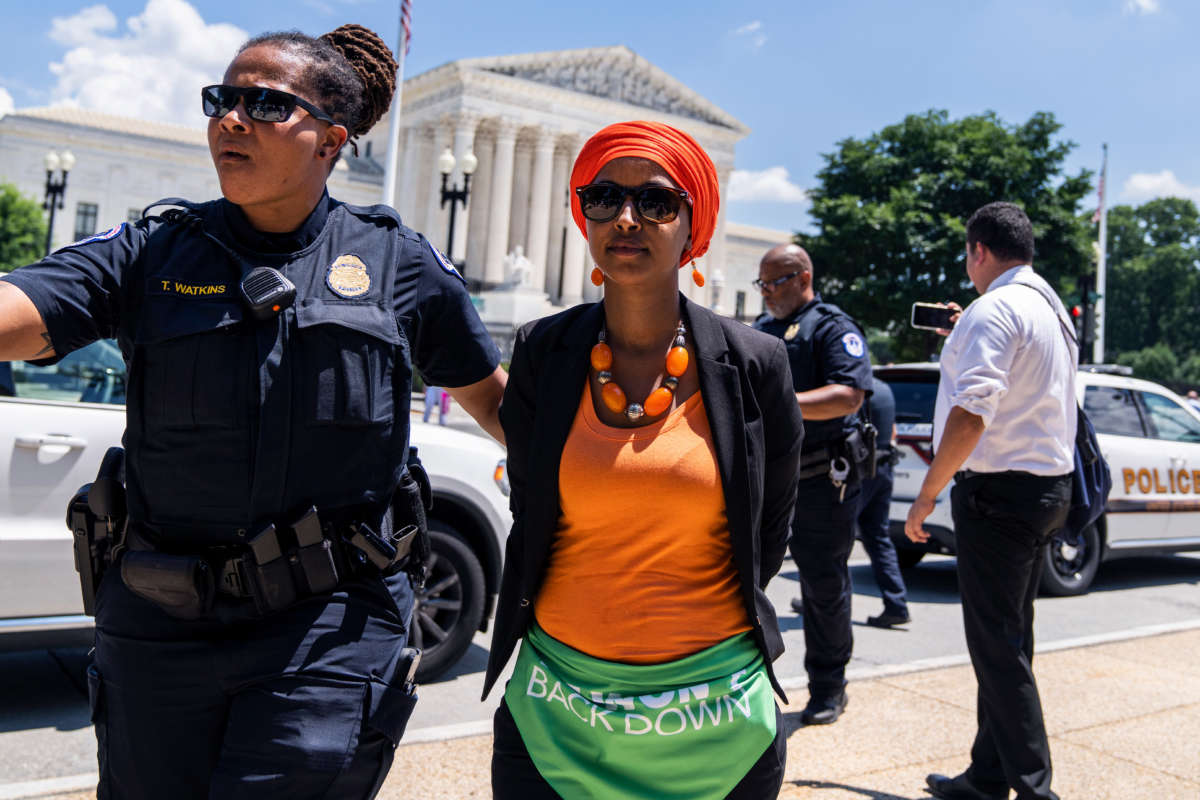Did you know that Truthout is a nonprofit and independently funded by readers like you? If you value what we do, please support our work with a donation.
Rep. Cori Bush, Rep. Alexandria Ocasio-Cortez, Rep. Ilhan Omar and at least 14 other Democratic members of Congress were among 35 activists arrested during a nonviolent protest for abortion rights in front of the Supreme Court on Tuesday.
The lawmakers, who were arrested for blocking traffic on First Street, NE, as part of the protest, are expected to be released and fined for the civil disobedience action.
The protest came on the heels of Rep. Bush and Sen. Tina Smith’s introduction of legislation on Monday that would codify national standards for administering abortion medication in order to protect access as extremist Republicans rush to drastically restrict reproductive health care.
Medication abortion accounts for over half of all abortions in the United States. The new legislation is the latest effort by Democrats across the country to shield abortion seekers and their doctors from criminalization, misogynist cruelty, and human rights abuses after the far right majority on the Supreme Court repealed their constitutional right to abortion last month.
“While extremist anti-abortion lawmakers in states like Missouri use the recent decision made by the stolen Supreme Court to attack a person’s right to bodily autonomy, I remain committed to ensuring everyone in this country can have access to an abortion — no matter where they live,” Bush said in a statement Monday.
Bush and other Democrats were arrested while blocking a street after protesters marched from the Capitol building to the Supreme Court on Monday, according to local reports.
Democratic lawmakers arrested by police at Tuesday’s rally including Ayanna Pressley (Mass.), Jackie Speier (Calif.), Bonnie Watson Coleman (N.J.), Rashida Tlaib (Mich.), Cori Bush (Mo.), Katherine Clark (Mass.), Andy Levin (Mich.), Alexandria Ocasio-Cortez (N.Y.), Alma Adams (N.C.), Veronica Escobar (Texas) and Carolyn Maloney (N.Y.), according to The Hill.

House Democrats passed a bill a second time last week that would establish a nationwide right to abortion and another bill to protect people who cross states lines to access abortion, an act that anti-abortion extremists are seeking to outlaw in multiple states. Not to be outdone, and only three weeks after several Republicans applauded the Supreme Court for sending the issue “back to the states,” Republicans proposed their own bill to ban abortion nationwide after as early as five weeks of pregnancy. At that point, most women don’t know they’re pregnant.
The GOP won’t have enough votes to pass a federal ban unless they win a veto-proof majority in the midterms. The Democratic bills are all but doomed in the Senate, where the filibuster allows the Republican minority to block legislation. However, Democrats are working to keep abortion rights in the headlines and put up a fight after years of legislative inaction, and Bush and Smith’s bill takes a pragmatic approach: Solidify secure pathways to safe abortion at home.
Medication abortion has been available in the U.S. since 2000, when it was approved by the Food and Drug Administration (FDA). Bush and Smith’s bill, the Protecting Access to Medication Abortion Act, would codify into federal law the FDA’s latest standards for administering abortion medication. During the pandemic, the FDA expanded its Risk Evaluation and Mitigation Strategy, or REMS, to allow patients to see prescribers in telehealth visits and access the medications through a small number of certified mail-order pharmacies, which have seen a massive increase in patient demand since the Supreme Court ruling in Dobbs.
If passed, Bush and Smith’s bill would enshrine the REMS standards into federal law, which could provide some federal legal cover for abortion rights activists coming to the aid of pregnant people in anti-abortion states and across state lines. It would also throw another wrench into the right-wing effort to wage convoluted legal battles across red and purple states to further restrict abortion.
While the bill is written to protect to access to abortion pills by remote visit and snail mail in states where abortion is still legal, it would not automatically overturn abortion bans or restrictions on medication at the state level. However, supporters believe the FDA has the final say over whether abortion medication is considered safe for use at home. That theory would likely be tested in court, and Attorney General Merrick Garland recently warned states that any attempt to ban abortion pills “based on a disagreement with the FDA’s judgement” would provoke a federal legal challenge.
President Biden and the Health and Human Services secretary have also vowed to ensure that abortion medication is as widely available as possible, according to reports.
Dobbs unleashed a growing public health crisis by creating chaos and uncertainty for providers and patients as statewide trigger-bans go into effect and red states race to pass extremist bills banning and restricting access to essential reproductive services. Patients in states such as Texas are already traveling across the country to receive abortion care, and reports indicate that women are being denied potentially lifesaving medical treatment for miscarriages and other conditions and forced to undergo traumatizing procedures.
The nation now faces a patchwork of laws related to abortion and prenatal care that vary from state to state, and there are major questions over how contraceptives and abortion medications will be regulated.
Republicans in at least nine states are pushing to ban medication abortion or restrict access to the medications with onerous requirements, according to the Guttmacher Institute. Currently, 29 states require that abortion medication prescribers be physicians rather than nurse practitioners or other prescribers, which can create barriers to access, especially if there is a shortage of doctors willing to treat abortion patients in red states.
At least 19 states require patients to see physicians in person, which could be considered illegal in the 13 states with trigger laws that ban almost all abortions, including the eight states where bans are already in effect. Mailing abortion pills to patients is banned in Texas, Arizona and Arkansas, and a handful of states ban medication abortion at a certain point in pregnancy. Bush and Smith’s bill would not automatically nullify these restrictions, but some Democrats believe federal agencies could use the FDA’s authority over drug regulation to preempt state bans.
Abortion medication is considered safe and effective up to 10 weeks, but some people safely use the drugs later in pregnancy as well. Only about 40 percent of women between the ages of 18 and 49 say they have heard of mifepristone, the main drug used for medication abortion. Still, rates of medication abortion have steadily risen for years before becoming increasingly accessible during the pandemic.
Bans on abortion and abortion medication are expected to exacerbate deep racial inequities in health care and maternal mortality, according to a fact sheet released by Bush:
States with abortion bans or extreme abortion restrictions are home to 39 percent of the total US population but 45 percent of Black women and girls under age 55. Abortion bans and restrictions on reproductive health disproportionately endanger Black people, and could have severe or deadly consequences on maternal and infant health. With the recent Supreme Court ruling overturning Roe v. Wade, it is critical that the federal government use every tool available to protect access to medication abortion.
The White House said on Monday it “strongly” supports separate Democratic legislation that would protect the right to access FDA-approved contraceptives nationally, a grave sign that basic privacy rights are under threat due to the right-wing assault on reproductive health. House Democrats are reportedly expected to a vote on a bill this week that would ensure the right to marry for same-sex couples.
By enshrining the FDA’s rules allowing for telehealth and mail-order abortion care into federal law, Bush and Smith likely hope to leave open potential pathways to having an abortion at home — even if a particular state does not technically allow it — and to at least boost the federal government’s power to protect the right to abortion medication. Advancing the legislation would also force Republicans to debate access to medication abortion, which could soon be the only option for millions of people.
“Abortion care is health care and, therefore, a human right — period,” Bush said.
This story has been updated.
A terrifying moment. We appeal for your support.
In the last weeks, we have witnessed an authoritarian assault on communities in Minnesota and across the nation.
The need for truthful, grassroots reporting is urgent at this cataclysmic historical moment. Yet, Trump-aligned billionaires and other allies have taken over many legacy media outlets — the culmination of a decades-long campaign to place control of the narrative into the hands of the political right.
We refuse to let Trump’s blatant propaganda machine go unchecked. Untethered to corporate ownership or advertisers, Truthout remains fearless in our reporting and our determination to use journalism as a tool for justice.
But we need your help just to fund our basic expenses. Over 80 percent of Truthout’s funding comes from small individual donations from our community of readers, and over a third of our total budget is supported by recurring monthly donors.
Truthout has launched a fundraiser to add 500 new monthly donors in the next 9 days. Whether you can make a small monthly donation or a larger one-time gift, Truthout only works with your support.
